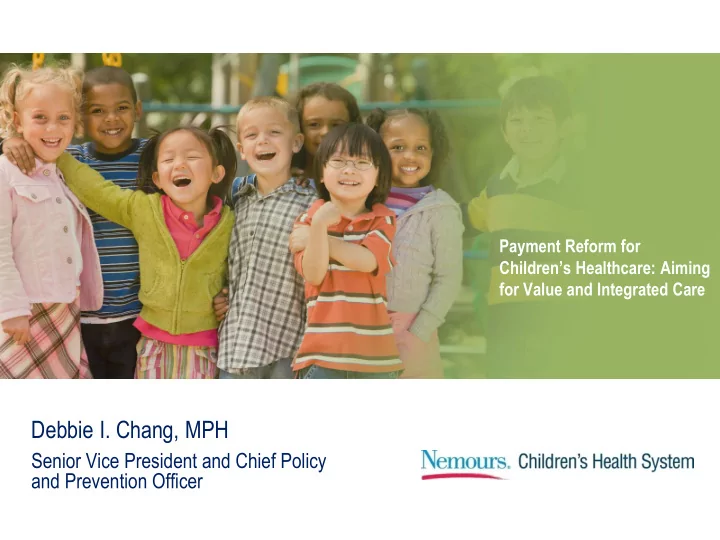

Payment Reform for Children’s Healthcare: Aiming for Value and Integrated Care Debbie I. Chang, MPH Senior Vice President and Chief Policy and Prevention Officer
2
Promoting a New Model of Paying for Value Sick Care System Health and Wellness System Pay for Volume Pay for Value Pay for Sickness Pay for Health Outcomes Reactive Proactive (See children when they (Actively manage their care and come in) prevent) Growing up healthy Illness/Treatment Transformational Incremental 3
Health Cannot Stop Midstream https://www.healthaffairs.org/do/10.1377/hblog20190115.234942/full/?utm_source=Newsletter&utm_medium=email&utm_content=Social+Determi nants+of+Health%3B+Putting+Patients++Goals+At+The+Center+Of+Care%3B+Digital+Health+Companies&utm_campaign=HAT 4
Examples 5
Nemours CMMI Award in Delaware • Identify • Bus Idling Themes • Interact with Changes System • Develop Families Navigator Integrator • Medicaid Changes Action • Collect Data Formulary Plans with Changes Community 6
Community Based Results in Delaware Potential Reach – Over 42,000 children • Reducing school bus idling – 14,029 children impacted • Medicaid drug formulary changes – 11,805 children impacted • Smoke-Free Wilmington Ordinance – 19,224 children impacted • 100% of Telamon Head Start childcare centers in Delaware are asthma-friendly – 852 children impacted annually • Healthy Homes/Integrated Pest Management >20,000 children 7
Aligning Incentives for Success Sustained and Collaboration Changes to Aligned Improved Strong Health with Community Systems and Payment Health Care Initiatives Partners to Policies System Outcomes for Address SDOH Kids 8
Medicaid/CHIP and Early Care and Education Collaboration Initiatives Nemours provides technical assistance to states to implement pilot projects that advance upstream prevention by strengthening integration across the Medicaid and ECE sectors. Projects : District of Columbia : Improve coordination between ECE providers and Medicaid providers on completion of developmental screening, sharing information and ensuring that families receive follow-up services when needed. Maryland : Support planning for a childhood obesity prevention pilot in Head Start to embed a dietician in a Head Start center to bill for services provided to Medicaid/CHIP enrollees through individual assessment and group nutritional counseling including helping the dietician enroll as a provider through the Managed Care Organization. Washington : Increase alignment of Medicaid and Department of Child, Youth, and Family (DCYF) and deliver services with a unified approach in a manner that optimizes family’s access. Florida & Georgia : Nemours is conducting initial scoping discussions with state partners. 9
National Academies Collaborative on Accountable Communities for Health for Children and Families Co-chairs: Nemours & Mental Health America Goal: to identify factors that have led to and can catalyze further ACH models focused on children and families 10
Moving Health Care Upstream www.movinghealthcareupstream.org Based on the notion that health systems can address persistent and costly health inequities by moving “upstream” -- beyond the walls of hospitals and doctor’s offices and into the community, collaborating with community-based organizations to address the root causes of disease Supports health systems and other stakeholders in testing and spreading strategies to move upstream, informing the field and accelerating upstream movement Collaborative effort that was co-led by Nemours and UCLA’s Center for Healthier Children, Families & Communities and funded by The Kresge Foundation 11
Leading Edge States Promoting Child Health North Carolina New York Oregon Launched First 1,000 Days on Coordinated Care North Carolina is currently Medicaid Initiative, a cross- Organizations (CCOs) work in undergoing a major delivery sector approach that features conjunction with Early system transformation that establishes robust care 10 evidence-based Learning Councils promote management, including interventions found to kindergarten readiness promote child development through alignment of quality requirements to address by improving birth outcomes, measures, joint support for socio-economic drivers of addressing child/caregiver developmental screening, health outcomes such as housing instability, food mental health, increasing trauma-informed training on insecurity, lack of home visiting, supporting adverse childhood early literacy in primary care experiences transportation and and via other strategies interpersonal violence Source: Manatt Health Strategies, LLC, LLC 12
Early Lessons 13
Promoting Prevention in Medicaid: Lessons from “Pathways through Medicaid to Prevention” Project Overcoming Barriers Facilitators to Success Understand what Medicaid can and High- level state, community and “c - can’t pay for suite” executive champions Demonstrate business case for Establishment of long-term prevention prevention and population health goals Collaborate across sectors and Alignment of Medicaid and child establish leadership buy-in serving organizations Medical Loss Ratio changes allow for Incentives for shifting to value-based investment in population health payment Address antiquated or non-existent Robust data collection and sharing data collection or sharing systems infrastructure 14
Year 1 Payment Lessons from National Academies Collaborative Funders Should: Community Should: Cultivate relationships early on to focus on financial sustainability and leverage integrator(s) to catalyze and sustain the Support integrators work Catalyze testing of and community pediatric/dyadic financing Partner with states to develop payment models to mechanisms that address health- promote shared innovative models and data integration related social needs accountability and pilots – leading to systemic change – goals and explore leveraging existing Medicaid authority and Sec. 1115 Ensure public and Medicaid waiver authority Invest in economic private payers and modeling and managed care plans Work with partners to design a benefit cost are engaged early estimation to assign balanced portfolio of interventions and as communities value to prevention come together deliver value across sectors over time Test community-level financing mechanisms to align with the metrics included in value-based payment models Note: NAS does not endorse lessons. 15
Lessons from Moving Health Care Upstream • Sustainability requires a combination of organizational policy and practice change • Change requires capacity building • Dedicated time • Knowledge and skills • Buy-in at multiple levels is essential • Leadership • Front line • Codifying in organizational strategic plan and dashboards • External environment plays a role in opportunities for change • Be strategic AND adaptive Source: The Kresge Foundation 16
Debbie I. Chang, MPH Senior Vice President and Chief Policy and Prevention Officer Deborah.chang@nemours.org 202-457-1455 www.nemours.org www.healthykidshealthyfuture.org www.movinghealthcareupstream.org 17
Recommend
More recommend